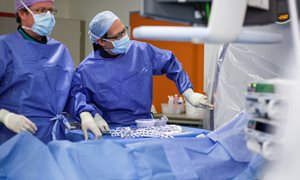
Shortly after suffering a stroke, young patients are more often diagnosed with cancer than young people who are not affected by a stroke, reveals a study conducted by Radboud university medical center among nearly 400,000 stroke patients. This suggests that cancer may play a role in the development of stroke in these patients.
Stroke only affects older people, right? Well, no. Every year, about three thousand Dutch people under the age of fifty suffer a stroke. In this condition, a part of the brain is temporarily deprived of oxygen because of problems with the blood supply. For example, a blood clot can occlude a blood vessel and cause ischemic stroke. A blood vessel can also rupture, causing cerebral hemorrhage.
It is largely unknown why young people suffer a stroke. A study from Radboud university medical center now reveals a remarkable association between strokes and cancer at a young age. ‘We have been researching young patients with strokes for many years’, says physician-researcher Jamie Verhoeven of the Department of Neurology. 'Some time ago, we noticed that relatively many of these patients eventually die of cancer. That surprised us, as we had expected cardiovascular disease to be the main cause of death. We then started delving further into this.’
Cancer more frequent
Verhoeven and her colleagues collected data from nearly 400,000 Dutch individuals who suffered a stroke between 1995 and 2018. They investigated how many of these people were subsequently hospitalized for cancer. This was compared to the number of cancer cases in young people without strokes. This revealed that, for patients younger than fifty suffering from ischemic stroke, the number of cancer diagnoses in the following year was two-and-a-half times higher. For young patients with intracerebral hemorrhage, it was even more than five times higher. The most frequently observed cancers in these patients were lung and blood cancers.
Professor of Neurology Frank-Erik de Leeuw led the study and explains these striking results: ‘This provides an indication that cancer may play a role in the development of stroke in a subgroup of young patients. It is likely that the cancer was already present when the patient suffered the stroke. It just had not been diagnosed yet.’ The researchers think that blood coagulation may be involved, as cancer is known to activate the coagulation system. In turn, this can lead to occlusion of, or damage to the blood vessels.
Default screening?
Should we now screen all young stroke patients for cancer? ‘It's too early for that’, says de Leeuw. According to him, more studies are needed. For example, it needs to be established whether there are specific characteristics associated with an increased risk of cancer in these patients.
De Leeuw: ‘Screening everyone is dangerous. Doctors will find all kinds of small abnormalities by chance. These require further investigation, which is not without risks. Think, for example, of scans or a biopsy in which a piece of tissue is removed. The mental strain associated with such investigations is also high, while the chances of having an underlying cancer remain very small, even in this group.’
About this publication
This study was published in JAMA Network Open: Association of stroke at young age with new cancer in the years after stroke among patients in the Netherlands. J.I. Verhoeven, B. Fan, M.J.M. Broeders, C.M.L. Driessen, I.C.H. Vaartjes, C.J.M. Klijn, F.E. de Leeuw. DOI: 10.1001/jamanetworkopen.2023.5002.
Data used in this study were provided by Statistics Netherlands (‘Centraal Bureau voor de Statistiek’). Furthermore, data obtained from the Netherlands Comprehensive Cancer Organisation (‘Integraal Kankercentrum Nederland’) were used.
-
Want to know more about these subjects? Click on the buttons below for more news.







